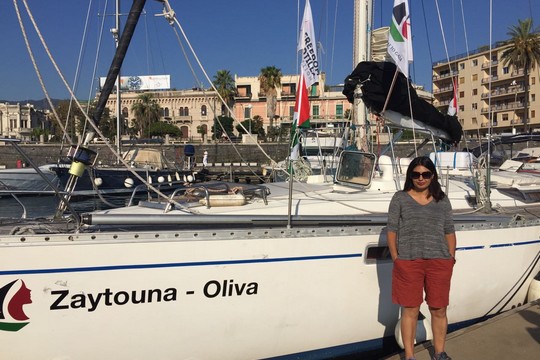Technical problems kept myself and almost 20 other women off the latest Gaza flotilla. Despite my disappointment, I wish these inspirational women nothing but a safe journey.

“If everything goes according to plan, on Monday, September 26 an all-woman flotilla will set sail for Gaza. If everything goes according to plan, I will be on that flotilla.” That is what I wrote before leaving for Messina, Sicily to join the eighth Gaza flotilla last week. My doubts were apparently well founded, since everything did not go according to plan.
In fact my doubts began even before leaving Israel. At that point we had already learned that one of the two boats (which turned out to be small sail boats), the Amal—Hope, was having severe technical problems and would not set sail alongside the Zaytouna. But the flotilla’s organizing team promised that intense efforts were being made to find a replacement boat, and that chances were high that two boats would set sail together.
The staff eventually found a replacement, the “Amal-Hope II,” on which technical problems were also subsequently discovered, preventing the replacement boat’s departure as well. By Saturday it was doubtful whether either of the Amals would be able to join. That would mean that nearly half the women who came from across the world would not be able to go on the journey.
The widow
Despite that very real possibility, we continued planning for departure. Messina’s mayor, who cordially hosted the delegation, allowed us to use the gorgeous city hall building for our meetings, receptions, and public events. He came to each one in jeans, sandals, a faded tricot shirt with the words “Free Tibet” printed on it, and a scarf decorated with the colors of the Palestinian flag. The warmth he projected, as well as his sincere support for us, was worlds apart from Nir Barkat, the pretentious, extremist mayor who holds the keys to Jerusalem, my home city.

Some of the most memorable moments of our time in Messina were at the nonviolence workshops at city hall. The motif of nonviolence is a central one to the flotilla — not only as a method of action but as moral and ideological position. The workshop, which was led by a veteran activist from the U.S., included a simulation of the boat’s takeover by the Israeli navy. Since a handful of participants had already sailed on previous flotillas, one could only assume that the simulation was an accurate reflection of what could actually happen.
Read: Why I’ll be on the Gaza flotilla this Jewish New Year
The hardest part, however, was seeing Chadam’s reaction. Chadam was by her husband’s side when he was killed by Israeli commandos aboard the Mavi Marmara six years ago, and had traveled from Turkey to Messina in order to take part in the flotilla. She spoke only Turkish and thus needed the help of a local translator. A photo of her dead husband is framed in a small pendant she never takes off her neck. She had come to Messina to complete the mission that he could not six years ago.
A general meeting was called for Monday at noon. According to the original plan, this was the day that the two boats were meant to depart. The Zaytouna‘s departure had already been delayed by a day, and it was unclear whether Amal—Hope II would even sail, or which women would be chosen to sail aboard the Zaytouna.
Between refugees and cruise ships
Even before the meeting we headed to the port to meet nearly 100 schoolchildren who came to speak and listen to the activists. It turns out that the flotilla is considered as an educational opportunity in Messina. Throughout our entire stay in the city, a large number of passersby came to speak with the activists — to ask questions, to understand what we’re doing. On the way to the boats we passed by a ship that had brought 900 refugees from different countries. Since the UK and Germany began taking harsher measures against the refugees, Italy has become a central destination. It is difficult to put into words the deep sadness that comes from seeing young people, families, children, disembark with whatever pieces are left of their lives. The Syrians aboard, it turns out, would receive refugee status. The rest would be able to stay in Italy for five-seven days before being forced to leave.
All of a sudden one of the young men — who likely understood his fate — decided to flee from the Red Cross’ encampment. He was able to escape the police officers in the port, but his pants got caught on the fence he tried to jump, and he was left hanging upside down until a group of officers caught up and brought him back to the encampment. I could only hang my head and keep walking toward our boats. A few dozen meters away, passengers were embarking onto a large cruise ship a pleasure cruise.
At noon we met for an update. The situation was as follows: the Zaytouna was ready for departure, and would set sail the following day, on Tuesday. Amal—Hope II was still unable to depart. The attempts to fix the technical issues continued unabated, meanwhile the team was working on finding yet another boat, an Amal III. Nothing was guaranteed, which meant that aside from the 13 women on the Zaytouna, it was unclear if the others would be able to set sail. Those who wanted to and were able would stay in Messina until Friday, when the it would be decided if a second boat could depart for Gaza. We all sat around waiting to hear the list of the 13 women who would get to sail on the Zaytouna.
Organizing such a large-scale project is no easy task, and the international organizing team had spent months making sure it came to fruition. The decision of who would board the ship and who would stay behind was one of the toughest to make. Over 20 women from across the globe took time out of their lives to participate in this journey out of a deep obligation to what it represents. All of them were invested, both ideologically and emotionally, in this project. When taking into account that three of the spots on the Zaytouna were reserved for the captain and her crew, one for the doctor, and at least one more spot for a journalist, it was clear that many women would be leaving the meeting very disappointed.
The Israelis are left behind
In the end the list included to two members of parliament from New Zealand and Algeria, Nobel Peace Prize Laureate Mairead Maguire (who took part in two previous flotillas), two journalists from Al Jazeera, and women who raised funds for the flotilla in their home countries. Once again Chadam’s face caught my eye when she was told she would not board the Zaytouna. She announced that she intended to be on deck, but in the end she stood with us on the pier the next day and waved goodbye to her friends who sailed away without her.
At the end of the meeting, those who were picked to board the Zaytouna went out to do some last-minute shopping before their difficult journey. I, on the other hand, made arrangements for my flight back to Israel. I had originally bought a one-way ticket to Italy. The return was meant to be arranged by the IDF, which would tow us back to Ashdod Port.
On the way I thought about how, beyond my personal disappointment, I was disappointed by the fact that the flotilla organizers — or at least some of them — did not think that an Israeli presence aboard the boats held any special significance (Channel 2 reporter Efrat Lechter was also left off the boat). Giving up on the Israeli public for the sake of others — who need no convincing — is saddening. At the same time I am keenly aware of the various considerations that needed to be taken into account. In other words, I would not change places with anyone on the organizing team.
In the end, despite not having reached my destination, there was not a single moment I would take back. I got to meet incredible, brave women who are advancing inspirational struggles in their home countries. I also got to make new friends — friendships that will undoubtedly remain even after we return to our own lives.
Just a moment before I packed my things, I offered my sleeping bag to Mairead Maguire, with whom I shared a room on my last night in Messina. The nights on the boat were going to be cold and wet, and it’s always a good idea to equip oneself with more gear. She accepted my offer with her lovely smile. The fact that this incredible woman, a Nobel Peace Prize laureate who is so full of hope, will be keeping warm in my sleeping bag, assuages my disappointment just a little.
I wish these women a peaceful journey. To the residents of Gaza, and to the rest of us: I wish a year of freedom and dignity.
This article was first published in Hebrew on Local Call. Read it here.


